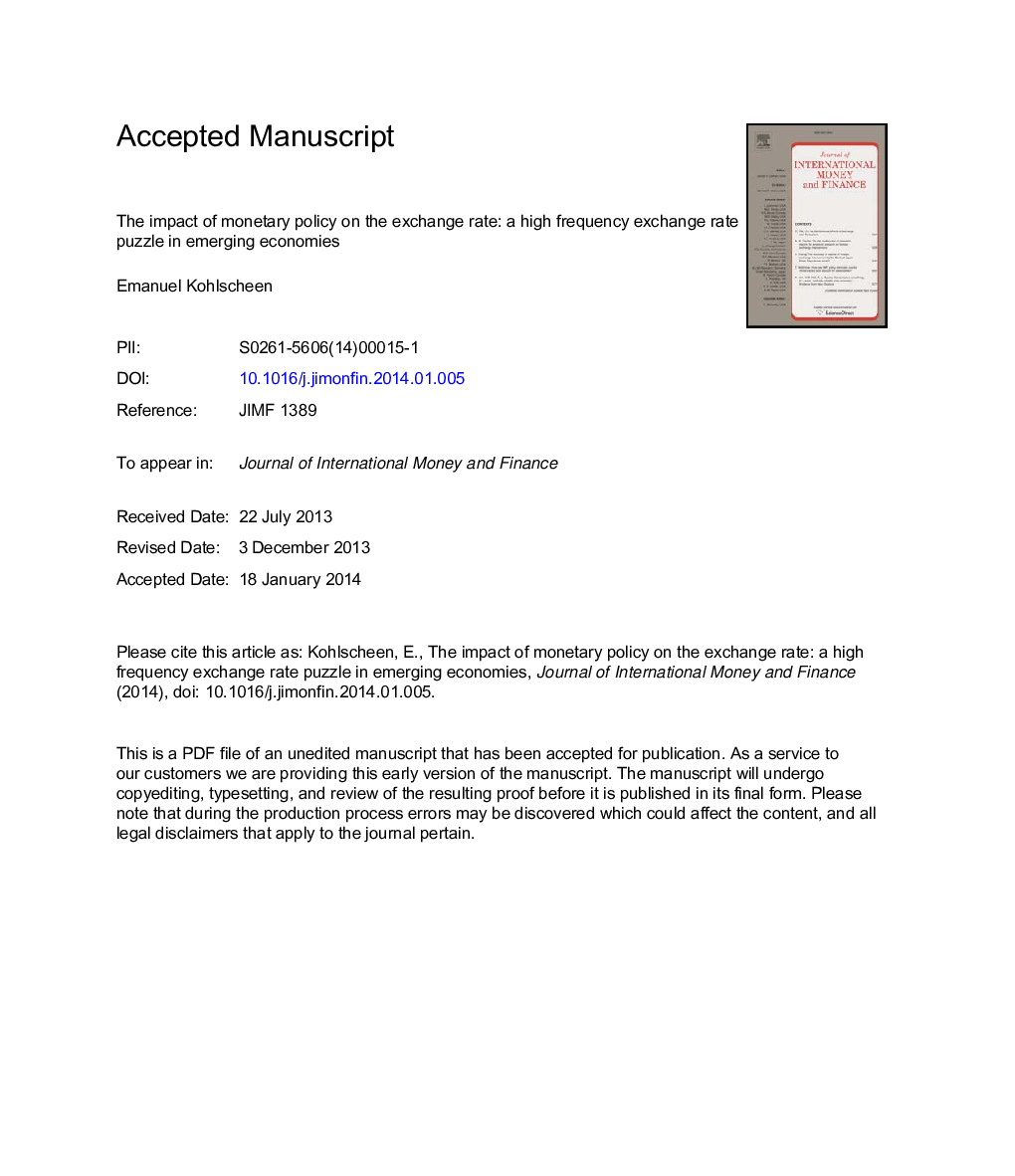| کد مقاله | کد نشریه | سال انتشار | مقاله انگلیسی | نسخه تمام متن |
|---|---|---|---|---|
| 7365756 | 1479172 | 2014 | 61 صفحه PDF | دانلود رایگان |
عنوان انگلیسی مقاله ISI
The impact of monetary policy on the exchange rate: A high frequency exchange rate puzzle in emerging economies
ترجمه فارسی عنوان
تاثیر سیاست پولی بر نرخ ارز: یک پازل نرخ ارز با نرخ فرکانس بالا در اقتصادهای نوظهور
دانلود مقاله + سفارش ترجمه
دانلود مقاله ISI انگلیسی
رایگان برای ایرانیان
کلمات کلیدی
نرخ بهره، قیمت ارز، سیاست های پولی، تسلط مالی، مطالعه رویداد،
ترجمه چکیده
این مطالعه به بررسی تاثیر شوک های سیاست پولی بر نرخ ارز برزیل، مکزیک و شیلی می پردازد. ما متوجه می شویم که حتی تمرکز بر تغییرات نرخ ارز 1 روزه در پی رویدادهای سیاسی که احتمالا به طور قابل توجهی باعث کاهش احتمال عواقب معکوس می شود، حمایت از این دیدگاه را افزایش می دهد که افزایش نرخ غیرمنتظره نرخ بهره را افزایش می دهد. این کمبود حمایت تجربی برای پیش بینی مدل های استاندارد اقتصادی باز، بدون در نظر گرفتن اینکه آیا ما از دلار آمریکا یا نرخ ارز موثر استفاده می کنیم یا نه، آیا تغییرات در نرخ سیاست که با مداخلات نرخ ارز دنبال می شوند، حذف می شوند، چه آلودگی؟ حوادث از تجزیه و تحلیل حذف شده و یا اینکه ما اجازه می دهد برای غیر خطی. ما استدلال می کنیم که این نسخه قوی تر از پازل نرخ ارز به تسلط مالی بستگی دارد زیرا افزایش نرخ غیرمنتظره با افزایش حق بیمه ربطی ندارد و نتایج مشابهی در مورد شیلی - کشوری که دارای بالاترین احتمال اعتبار کوتاه مدت از سال 1995 و نسبت بدهی / تولید ناخالص داخلی کمتر از 10٪ است.
موضوعات مرتبط
علوم انسانی و اجتماعی
اقتصاد، اقتصادسنجی و امور مالی
اقتصاد و اقتصادسنجی
چکیده انگلیسی
This study investigates the impact of monetary policy shocks on the exchange rates of Brazil, Mexico and Chile. We find that even a focus on 1 day exchange rate changes following policy events - which reduces the potential for reverse causality considerably - fails to lend support for the view that associates unexpected interest rate hikes with immediate appreciations. This lack of empirical backing for the predictions of standard open economy models persists irrespective of whether we use the US Dollar or effective exchange rates, whether changes in the policy rate that were followed by exchange rate interventions are excluded, whether “contaminated” events are dropped from the analysis or whether we allow for non-linearities. We argue that it is difficult to attribute this stronger version of the exchange rate puzzle to fiscal dominance, as unexpected rate increases are not associated with increases in risk premia, and similar results are obtained in the case of Chile - a country that has had the highest possible short-term credit rating since 1995 and a debt/GDP ratio below 10%.
ناشر
Database: Elsevier - ScienceDirect (ساینس دایرکت)
Journal: Journal of International Money and Finance - Volume 44, June 2014, Pages 69-96
Journal: Journal of International Money and Finance - Volume 44, June 2014, Pages 69-96
نویسندگان
Emanuel Kohlscheen,
